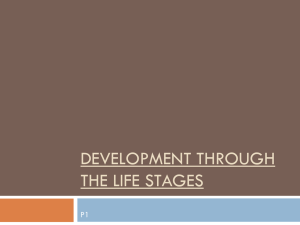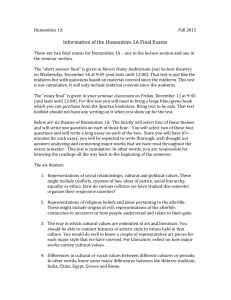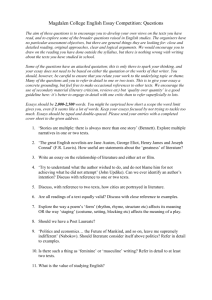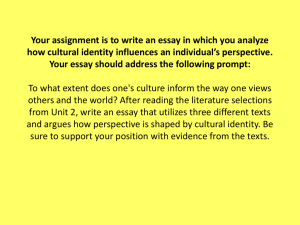section 1: module specifications
advertisement
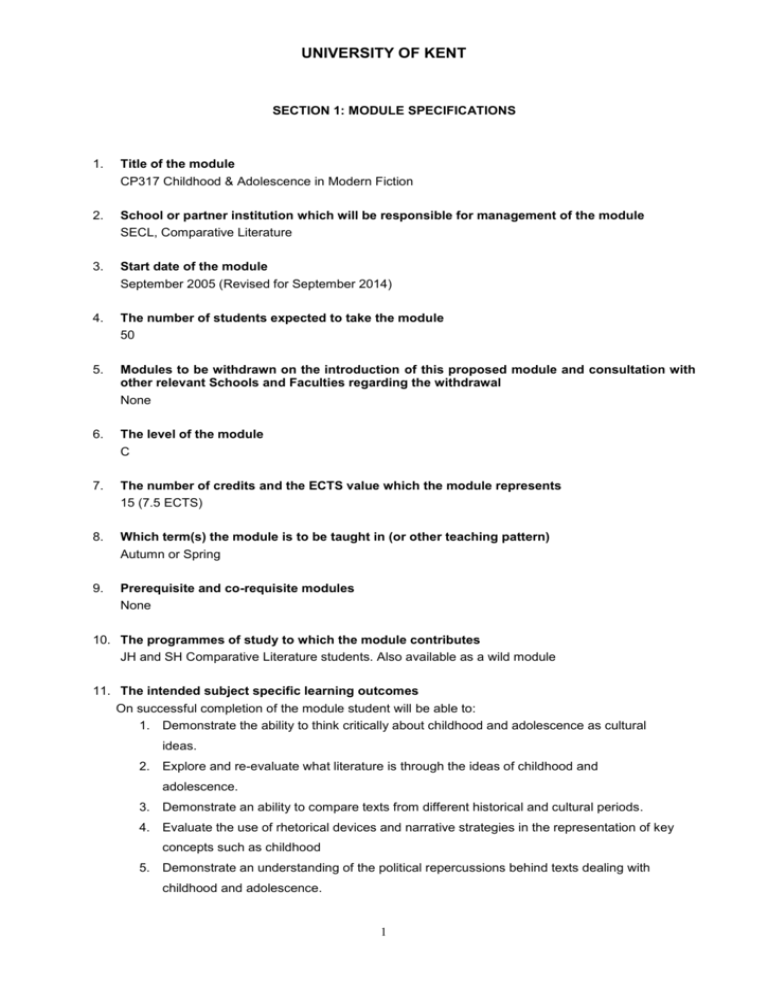
UNIVERSITY OF KENT SECTION 1: MODULE SPECIFICATIONS 1. Title of the module CP317 Childhood & Adolescence in Modern Fiction 2. School or partner institution which will be responsible for management of the module SECL, Comparative Literature 3. Start date of the module September 2005 (Revised for September 2014) 4. The number of students expected to take the module 50 5. Modules to be withdrawn on the introduction of this proposed module and consultation with other relevant Schools and Faculties regarding the withdrawal None 6. The level of the module C 7. The number of credits and the ECTS value which the module represents 15 (7.5 ECTS) 8. Which term(s) the module is to be taught in (or other teaching pattern) Autumn or Spring 9. Prerequisite and co-requisite modules None 10. The programmes of study to which the module contributes JH and SH Comparative Literature students. Also available as a wild module 11. The intended subject specific learning outcomes On successful completion of the module student will be able to: 1. Demonstrate the ability to think critically about childhood and adolescence as cultural ideas. 2. Explore and re-evaluate what literature is through the ideas of childhood and adolescence. 3. Demonstrate an ability to compare texts from different historical and cultural periods. 4. Evaluate the use of rhetorical devices and narrative strategies in the representation of key concepts such as childhood 5. Demonstrate an understanding of the political repercussions behind texts dealing with childhood and adolescence. 1 UNIVERSITY OF KENT 12. The intended generic learning outcomes On successful completion of the module student will be able to: 1. Undertake independent research through problem-solving around the prescribed set texts. 2. Demonstrate and improved practice in reading, writing and group work 3. Demonstrate improved communication, presentation and leadership skills having participated in seminar discussions and preparing for the group presentation. 4. Demonstrate well-documented critical and comparative writing skills. 5. Demonstrate an ability to synthesize, summarize, and present their arguments cogently about a work of literature. 13. A synopsis of the curriculum Who and what is ‘a child’, and what is adolescence? This module examines the representation of childhood and adolescence in a cross-section of texts from modern literature within the context of World Literature studies. Students will pay close attention to the rhetoric and techniques of storytelling woven around these themes, as well as to relevant socio-political debates, while also examining how these specific texts function across cultures. The module encourages students to find innovative approaches to the topic, and at the same time invites them to explore the relationship between literature and childhood and the joy of reading often associated with childhood and adolescence. 14. Indicative Reading List Collodi, Carlo. 2002. The Adventures of Pinocchio. Oxford: Oxford UP. Kipling, Rudyard. 2013. The Jungle Books. London: Penguin. Burnett, Frances Hodgson. 2011. The Secret Garden. Oxford: Oxford UP. Salman Rushdie, 1993. Haroun and the Sea of Stories. London: Penguin. Miles Franklin. 1980. My Brilliant Career. London: Virago. J.D. Salinger. 1994. The Catcher in the Rye. London: Penguin. Sylvia Plath. 2009. The Bell Jar. London: Faber. Kazuo Ishiguro. 2005. Never Let Me Go. London: Faber. 15. Learning and Teaching Methods, including the nature and number of contact hours and the total study hours which will be expected of students, and how these relate to achievement of the intended module learning outcomes This module will be taught by means of a 2 hour seminar for 10 weeks. The module is designed to foster critical thinking (learning outcomes 11.1,4) while exploring and re-evaluating literature through the ideas of childhood and adolescence in different cultural and political contexts (learning outcomes 11.1, 3, 5). It fosters creativity and independent research through problem-solving skills around the set texts (learning outcomes 12:1); there is a strong emphasis on group presentations, student led activities and discussion, which promote better communication and leadership skills (learning outcomes 12:2,3, 5). Time will be made available for supervision and discussion of essays in the form of a feedback session, which will help students improve and demonstrate critical and 2 UNIVERSITY OF KENT comparative writing skills, while synthesizing, summarizing, and presenting arguments cogently about literature (learning outcomes 12.4). Total Contact hours: 20 Total study hours: 150 16. Assessment methods and how these relate to testing achievement of the intended module learning outcomes 100% Coursework: Essay 1 (1500 words) 35% Essay 2 (2000 words) 55% Seminar Presentation (between 15 to 20 minutes): 10% Students will be provided with essay questions (though if they wish they may suggest their own essay questions providing these are approved by the seminar leader). The essay questions will normally address the various discussions during the seminars, although students will be encouraged to further examine relevant topics through independent research and explore various themes, characters, theoretical approaches, etc. in greater depth. The first essay will focus on a single text, exploring its themes, the overall tone, socio-cultural and political contexts, characters, etc. and will address learning outcomes 11.1, 2, 4 and 5, and 12.1, 4 and 5. The second essay will invite students to discuss and compare two texts, analysing the various themes, contexts, characters, gender issues, etc. and will address learning outcomes 11.1-5, and 12.1, 4 and 5. The seminar presentation, normally between 15 to 20 minutes and addressing the salient themes, contexts, characters, writing style, gender issues, etc. with regards to a selected text from the reading list, will address learning outcomes 11.3 and 5, and 12.2, 3, and 5. 17. Implications for learning resources, including staff, library, IT and space None 18. The School recognises and has embedded the expectations of current disability equality legislation, and supports students with a declared disability or special educational need in its teaching. Within this module we will make reasonable adjustments wherever necessary, including additional or substitute materials, teaching modes or assessment methods for students who have declared and discussed their learning support needs. Arrangements for students with declared disabilities will be made on an individual basis, in consultation with the University’s disability/dyslexia support service, and specialist support will be provided where needed. 19. Campus(es) where module will be delivered: Canterbury 3

